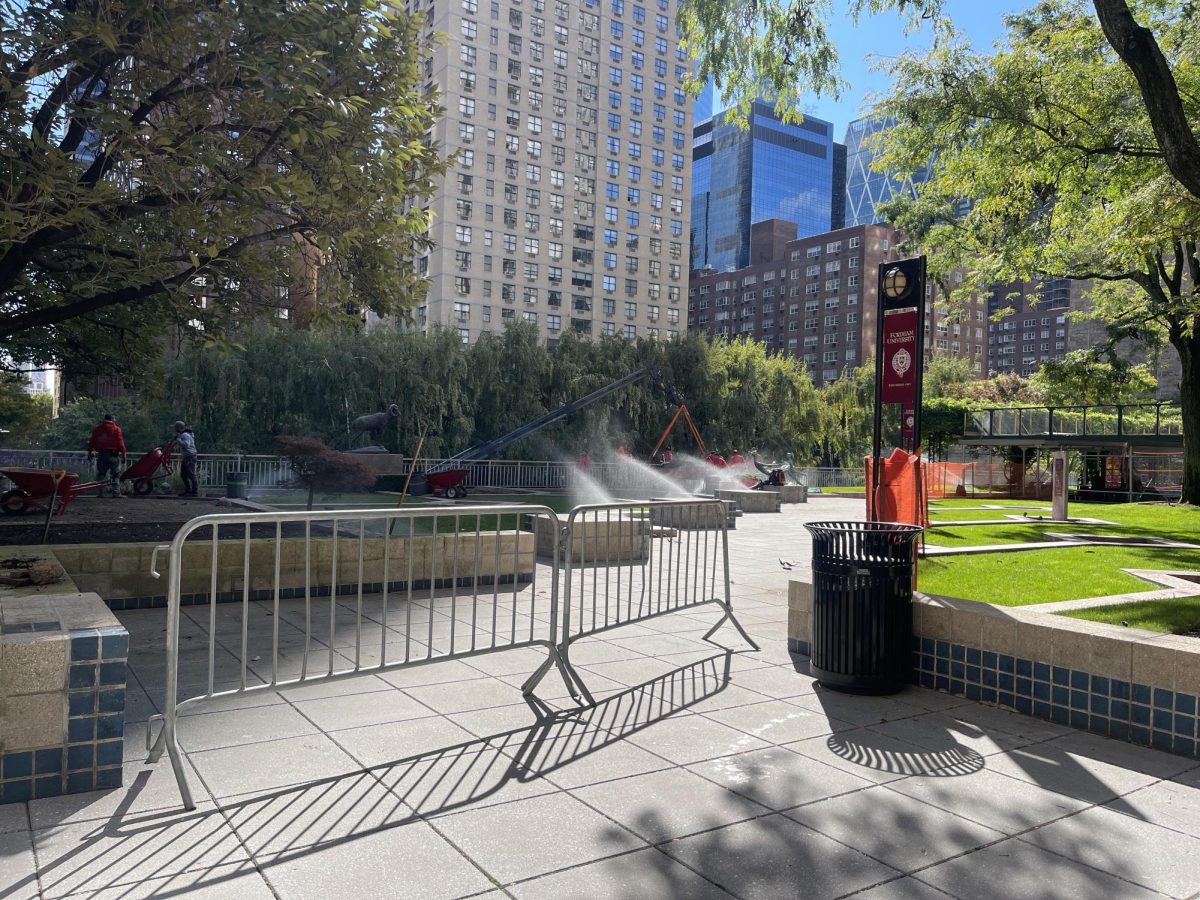New York City Mayor Eric Adams declared a drought warning on Nov. 18 amid the driest conditions in exactly a century, urging New Yorkers to voluntarily conserve water.
New York City’s reservoirs were at 60% capacity on Nov. 19 according to the city’s Department of Environmental Protection (DEP), down from about 79% normally.
Fordham has not outlined a plan to reduce its water consumption or promote the conservation of water on campus. Some members of the Fordham community are concerned that the university is not doing enough to reduce water consumption.
Fordham boasts Rose Hill as the largest green campus in New York City, and maintaining lawns such as those on Fordham’s campuses can be highly intensive for water usage.
Professor of journalism Amy Aronson said that Fordham should do more to reduce its own water usage amid the worsening drought.
“Is there anything the institution is doing to cut back its own water usage in food preparation or in the gardening and planting of the lawns?” Aronson said.
Fordham boasts Rose Hill as the largest green campus in New York City, and maintaining lawns such as those on Fordham’s campuses can be highly intensive for water usage.
Landscaping accounts for over a quarter of water used by schools, according to the EPA.
Aronson asked if Fordham was doing anything to address the drought in its landscaping operations.
“We’re following all the New York City codes, that’s all we have to say about it.” John McDonaugh, director of Facilities Operations at Lincoln Center
“Is there any response to the drought from the institution tending its own garden, so to speak?” Aronson said.
Will Schnider, associate director of Grounds & Transportation, declined to comment on Fordham’s water usage. John McDonaugh, director of Facilities Operations at Lincoln Center, said Fordham was in compliance with the city’s water regulations.
“We’re following all the New York City codes, that’s all we have to say about it,” McDonaugh said.
Fordham has touted its sustainability and environmentalist efforts in recent years, including a $50 million grantmaker partnership with the EPA and hosting a climate week summit in September. In 2018, Fordham committed to reduce water consumption on Lincoln Center by 5% over two years as a part of the New York City Department of Environmental Protection Water Challenge.
Fordham has framed environmentalism as part of its Jesuit mission, publishing the Laudato Si’ Action Platform after Pope Francis’s 2015 encyclical. Professor of theology, science and ethics Christiana Zenner said that Fordham should become a leader in water conservation as an extension of its stated environmental ethics.
“Since water is a collectively vital resource, and Fordham is a mission-driven institution, it’s a great opportunity to Fordham to consider how water-related conversation aligns with our increasing focus on sustainability,” Zenner wrote. “Fordham has an opportunity to lead by example!”
Julie Gafney, director of the Center for Community Engaged Learning, said she was unsure if Fordham was continuing water conservation efforts. However, she expressed hope that Fordham could approach water conservation as a holistic, community-wide effort.
“I’ve never seen the rivers this low or just fully dried up.” Julie Gafney, director of the Center for Community Engaged Learning
“I think this is the kind of thing that I think, along with other initiatives, it would be great to see departments, schools, administrative units coming together around just day to day activities that can actually make a significant difference,” Gafney said.
In addition to draining reservoirs, the lack of rainfall has sapped bodies of water. Gafney said rivers and creeks near her hometown in upstate New York were alarmingly dry.
“I’ve never seen the rivers this low or just fully dried up,” Gafney said. “So, you know, we’re seeing the impact here, in our day to day, but even just in the natural world, it’s stunning to see.”
“Despite us being in like the largest metropolitan area in the U.S., we are still affected by a drought.” Christian Hidalgo, FCRH ’25
Exceptionally dry conditions have raised the risk of fires in the region. Several brush fires have broken out in the city, including in Inwood Park, Prospect Park and Van Cortlandt Park. More fires have broken out in New Jersey, Connecticut and upstate New York. The Fire Department of New York has formed its first Brush Fire Task Force to respond to and contain fires in the five boroughs.
Smoke from the fires impacted air quality in the area and led to hazardous conditions for several days in November. The elevated fire risk prompted Mayor Adams to ban grilling in all city parks.
Little to no rainfall, drying reservoirs and wildfires have been a fact of life for many in the western United States. Christian Hidalgo, Fordham College at Rose Hill (FCRH) ’25, grew up in Bakersfield, California, which has faced drought conditions for much of the past decade. Hidalgo said that the drought makes it clear that water conservation is important on the East Coast as well.
“States like Colorado and California have long had watering restrictions during droughts. This is one move that could make a difference.” Christiana Zenner, professor of theology, science and ethics
“Despite us being in like the largest metropolitan area in the U.S., we are still affected by a drought,” Hidalgo said.
Drought-afflicted western states have implemented policies to conserve water. Zenner highlighted restrictions on water used for landscaping while drought conditions persist as a practical step to curb waste.
“States like Colorado and California have long had watering restrictions during droughts. This is one move that could make a difference,” Zenner wrote.
Meredith Leahy, FCRH ’25, works with Hidalgo at Fordham’s Students for Environmental Action and Justice club. She said that the drought and wildfires demonstrate that the consequences of climate change are already taking hold.
“Climate change isn’t this far off effect,” Leahy said. “It’s right on our doorstep really.”
Director of Residential Life Kelly Sosa said Fordham will create a flier including recommendations for voluntary water conservation from the DEP. Sosa said the flier will be distributed to RAs starting next week.
The DEP recommends that individual New Yorkers can conserve water by turning faucets off whenever possible, taking shorter showers and being vigilant about leaks in their homes.
The National Weather Service forecasts over an inch of rain for Wednesday night and early Thursday, providing some relief for the parched city.



